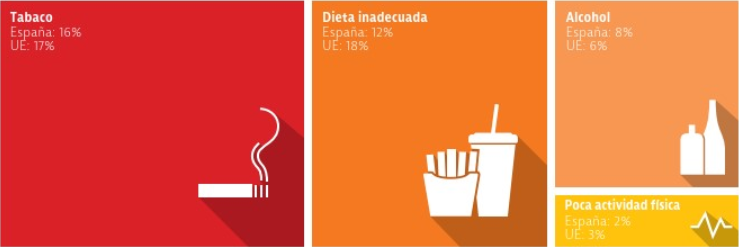April 7 is World Health Day. It is paradoxical that this year we will celebrate it confined due to a global pandemic. However, although #Istayhome, life goes on and we cannot let our guard down when it comes to health.
Each of us associates the fact of being at home with different habits: some to tranquillity and rest, others to domestic tasks, others to family. Whatever your situation, there are no excuses to do it in a healthy and active way.
Let’s put ourselves in situation with some data from the 2019 health profile in Spain published by the OECD (Organization for Economic Cooperation and Development):
- Spain is the EU country with the highest life expectancy: 83.4 years in 2017, which is 2.5 years above the EU average. Spaniards today can expect to live an additional 21.5 years after reaching the age of 65, 1.5 years more than the EU average. This increase in life expectancy was mainly caused by a considerable reduction in mortality rates from cardiovascular diseases, although mortality from Alzheimer’s disease increased as a consequence of the increase in life expectancy.
- Spain has some of the lowest mortality rates from preventable and treatable causes, indicating that public health and healthcare interventions are, in some cases, effective. However, much remains to be done as estimates suggest that more than a third of deaths in Spain can be attributed to risk factors associated with behavioural habits, including tobacco use, poor diet, alcohol consumption and sedentary lifestyle (see figure).

- In the case of smoking, an anti-smoking law was adopted in 2005 and was strengthened in 2010. The 2010 law strengthened the rules on the retail and advertising of tobacco products; increased protection for minors and non-smokers by expanding smoke-free zones to all public places; and promoted the application of smoking cessation programs, especially in primary care. At the same time, taxes on cigarettes were increased, by 3% per pack of cigarettes in 2013 and by 2.5% more in 2017, along with a 6.8% increase in taxes on rolling tobacco. All these measures have contributed to the fact that smoking rates have decreased in the last fifteen years. However, more than one in five Spanish adults (22%) continued to smoke daily in 2017, representing a higher proportion than the EU average (19%).
- Regarding overweight and obesity, the data is even more alarming. In 2005, the NAOS Strategy, managed by the Spanish Agency for Consumption, Food Safety and Nutrition, aimed to curb the increase in obesity in the Spanish population. This was reinforced by the Food Safety and Nutrition Law adopted in 2011, also with the aim of reducing overweight and obesity in children, prohibiting foods and beverages with a high content of saturated fatty acids, salt and sugar in schools and, more broadly, tightening the regulations on children’s menus. Recently, work has been carried out to establish a set of indicators that allow evaluating progress in their application and for the execution of health promotion activities in the area of nutrition, physical activity and obesity prevention (AECOSAN, 2019). In 2018, the Ministry of Health, Consumption and Social Welfare announced new measures to reinforce the NAOS Strategy and, among them, an initiative on a new labelling on the front of packages using the Nutriscore model. Using an easy-to-understand colour code (based on a “traffic light” approach), this initiative aims to provide citizens with more accurate information on the nutritional quality of food, although this measure has not yet been applied. In early 2019, the Ministry also signed an agreement with almost four hundred food companies that committed to reducing the content of saturated fatty acids, salt and added sugars in their products. However, the effects so far seem modest. In fact, the obesity rate has increased among adults, which may hinder progress in reducing cardiovascular mortality and other related causes of death: one in six Spaniards suffered from obesity in 2017 (17%), a increase compared to the figure of one in eight in 2001, also above the EU average (15%). This increase is related to poor physical activity among adults, as well as unhealthy nutritional habits: only about 35% of adults reported eating at least one vegetable a day. The same situation is found in the child-youth population. According to the PASOS study (2019), 14.2% of the child-youth population is overweight and obese as measured by BMI and 24.5% have abdominal obesity. The prevalence of childhood obesity has grown in the last two decades: 1.6% according to BMI and 8.3% according to abdominal obesity.
We cannot ignore the data. A healthy and active lifestyle contributes to our quality of life expectancy. Some basic recommendations:
- Move, live an active life: go up the stairs, go to work on foot or by bike whenever possible, choose games that involve movement to do with your children, dance, etc.
- Eat calmly: follow your feeling of satiety and not your emotions (avoid eating due to boredom, anxiety, etc.). Limit ultra-processed food (you can read further in the post: Realfood, fad or is it here to stay?). Include fruits and vegetables in all your intakes. Give priority to whole carbohydrates over refined ones. Vary the food every day. Eat quietly and if possible, in company.
- Hydrate yourself regularly throughout the day.
- Exercise daily: dedicate at least 30 minutes a day to the physical activity that you like the most and vary it.
- Rest and sleep between 6 and 8 hours a day.
- Spend time on activities you like: reading, walking, writing, dancing, painting, photography, movies, meditating, talking to someone who inspires you, etc.
Maintaining healthy lifestyle habits should be an ever-present motto in our lives, but it becomes essential in difficult situations like the one we are experiencing. It is at these times when initiatives like #AlimentActivos from FIAB (Federation of Food and Beverage Industries) take on special relevance. It is a website where they give us tricks and ideas, pose challenges for us and provide us with scientific data and information to lead a healthy and active lifestyle.
Do not forget that, through social networks, you can follow a multitude of profiles that inspire us in matters of healthy eating and cooking, physical exercise at home, how to maintain good mental health, as well as stay positive and relaxed.
At CARTIF, #westayathome exercising #health.
- You can also consume locally - 14 June 2024
- Skip ad… - 11 March 2022
- On World Health Day, #stayhome but do it in a healthy and active way - 7 April 2020

